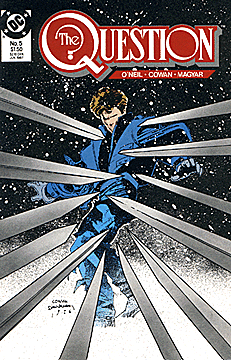The only known photo of (T.M. Maple) Jim Burke (left), taken with friend Russ Maheras._____
I had posted T.M. Maple's photo above, but decided it was against the theme of the topic I created here, and edited it to just a link, if you still want to see it.
The topic point is not what T.M. Maple, or any letterhack, actually look like (I started a topic several years ago showing photos of many comics professionals for that purpose.)
The point is the persona they create with their words on the pages of lettercolumns.
To that effect, this letter by T.M. Maple, from THE QUESTION 5, June 1987:

Dear Questionable Ones:
"The unique aspect about The Question is that he is a man with a secret identity, but without an alter ego."
That statement from #1's lettercol caused me to ponder a bit. I wondered if it was really true. Aren't most superheroes essentially the same in and out of costume? Superman has pretty much the attitudes and outlook of Clark Kent (especially the new version), after all. And doesn't, say, Green Arrow seek the same social justice that Oliver Queen supports, albeit in a more, um, physical way?
Seeking a solution to this apparent contradiction, I looked up "alter ego" in my dictionary, which defined it as "another aspect of oneself." Ah, now things start to fall in place!
Above when I talked of Superman and Green Arrow, I was basically saying their costumed identities were just another aspect of the total being, the flip side of the coin, so to speak.
But, to take your words literally, you are saying that The Question is not even a different aspect of Charles Victor Szasz, that one is indistinguishable from the other --a "two-headed coin", to follow my previous analogy. This indeed is an interesting premise, especially as Szasz himself sees it that way. It is certain to bring a unity and single-mindedness to the story, for if The Question is a crimefighter and is also indistinguishable from Szasz, then Szasz himself must be narrowly focused on fighting crime as well.
However, I wonder at the validity of this concept. You see, I have some personal experience in this area. I adopted "T.M. Maple" merely as a pseudonym for writing letters, so you could say that I too was someone with a secret identity but without an alter ego.
However, as time passed (eight and a half years now) a strange thing happened. I began to find that T.M. was indeed just slightly different from my everyday self. In some ways he had become a little more what I would like to be in my everyday life. To a small extent, there was a switch from me driving T.M. to be "better" to T.M. automatically assuming the desired characteristics. (Me? I'm perfectly sane! Oh, yes.)
My point is that if this could happen to me to this small extent (more a curious tendency than an uncontrollable compulsion, I hasten to add) in so feeble a secret identity (i.e., a little and not very intensely used), how could Szasz/Question escape a more dramatic and similar effect? Given the intense nature of his activities as The Question, how could he possibly retain indistinguishable cohesion between the two identities?
Is this an indication of a fanatical self-control or obsession, thus indicating further mental problems? Or is it the result of a good, strong conception of self, such that one is not adversely affected by mere artificial disguises? (Thus indicating that I'm a little wacko? Well, okay, we already know that I'm a little (!) nutsy, but I mean wacko in this particular sense... )
Incidentally, this lack of an alter ego could also jeopardize his secret identity. The Question and Szasz look and act so much alike that I fail to see how anyone familiar with both of them wouldn't figure out the connection sooner or later (and I think it would probably be sooner. )
--"T.M. Maple"
Box 1272, Station B
Weston, Ontario M9L 2R9
Canada